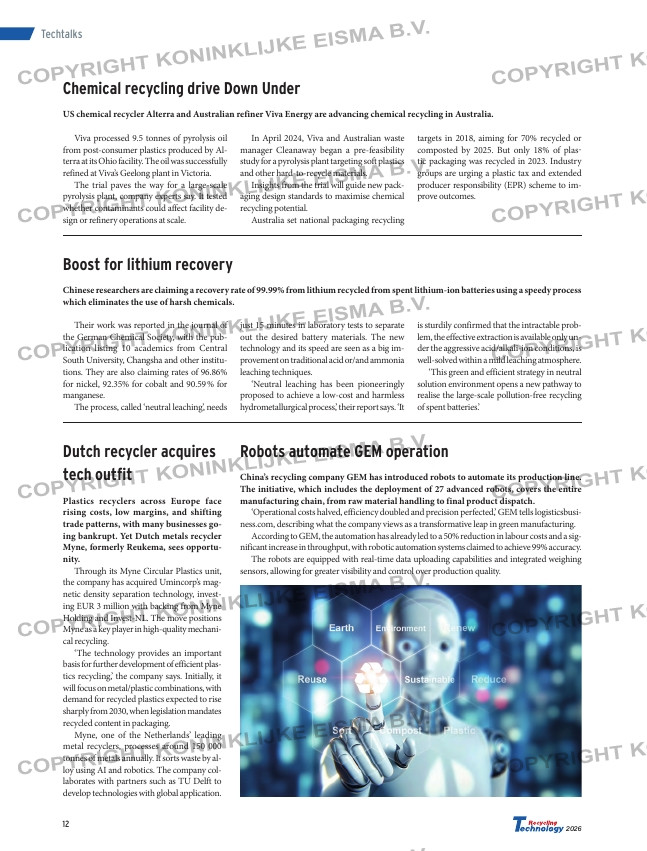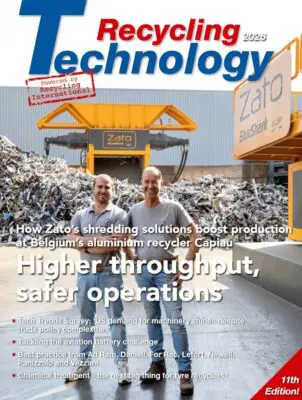Page 12 from: Recycling Technology edition 2026

12
Techtalks
2026
Robots automate GEM operation
China’s recycling company GEM has introduced robots to automate its production line.
The initiative, which includes the deployment of 27 advanced robots, covers the entire
manufacturing chain, from raw material handling to final product dispatch.
‘Operational costs halved, efficiency doubled and precision perfected,’ GEM tells logisticsbusi-
ness.com, describing what the company views as a transformative leap in green manufacturing.
According to GEM, the automation has already led to a 50% reduction in labour costs and a sig-
nificant increase in throughput, with robotic automation systems claimed to achieve 99% accuracy.
The robots are equipped with real-time data uploading capabilities and integrated weighing
sensors, allowing for greater visibility and control over production quality.
Dutch recycler acquires
tech outfit
Plastics recyclers across Europe face
rising costs, low margins, and shifting
trade patterns, with many businesses go-
ing bankrupt. Yet Dutch metals recycler
Myne, formerly Reukema, sees opportu-
nity.
Through its Myne Circular Plastics unit,
the company has acquired Umincorp’s mag-
netic density separation technology, invest-
ing EUR 3 million with backing from Myne
Holding and Invest-NL. The move positions
Myne as a key player in high-quality mechani-
cal recycling.
‘The technology provides an important
basis for further development of efficient plas-
tics recycling,’ the company says. Initially, it
will focus on metal/plastic combinations, with
demand for recycled plastics expected to rise
sharply from 2030, when legislation mandates
recycled content in packaging.
Myne, one of the Netherlands’ leading
metal recyclers, processes around 150 000
tonnes of metals annually. It sorts waste by al-
loy using AI and robotics. The company col-
laborates with partners such as TU Delft to
develop technologies with global application.
Boost for lithium recovery
Chinese researchers are claiming a recovery rate of 99.99% from lithium recycled from spent lithium-ion batteries using a speedy process
which eliminates the use of harsh chemicals.
Their work was reported in the journal of
the German Chemical Society, with the pub-
lication listing 10 academics from Central
South University, Changsha and other institu-
tions. They are also claiming rates of 96.86%
for nickel, 92.35% for cobalt and 90.59 % for
manganese.
The process, called ‘neutral leaching’, needs
just 15 minutes in laboratory tests to separate
out the desired battery materials. The new
technology and its speed are seen as a big im-
provement on traditional acid or/and ammonia
leaching techniques.
‘Neutral leaching has been pioneeringly
proposed to achieve a low-cost and harmless
hydrometallurgical process,’ their report says. ‘It
is sturdily confirmed that the intractable prob-
lem, the effective extraction is available only un-
der the aggressive acid/alkali-ion conditions, is
well-solved within a mild leaching atmosphere.
‘This green and efficient strategy in neutral
solution environment opens a new pathway to
realise the large-scale pollution-free recycling
of spent batteries.’
Chemical recycling drive Down Under
US chemical recycler Alterra and Australian refiner Viva Energy are advancing chemical recycling in Australia.
Viva processed 9.5 tonnes of pyrolysis oil
from post-consumer plastics produced by Al-
terra at its Ohio facility. The oil was successfully
refined at Viva’s Geelong plant in Victoria.
The trial paves the way for a large-scale
pyrolysis plant, company experts say. It tested
whether contaminants could affect facility de-
sign or refinery operations at scale.
In April 2024, Viva and Australian waste
manager Cleanaway began a pre-feasibility
study for a pyrolysis plant targeting soft plastics
and other hard-to-recycle materials.
Insights from the trial will guide new pack-
aging design standards to maximise chemical
recycling potential.
Australia set national packaging recycling
targets in 2018, aiming for 70% recycled or
composted by 2025. But only 18% of plas-
tic packaging was recycled in 2023. Industry
groups are urging a plastic tax and extended
producer responsibility (EPR) scheme to im-
prove outcomes.
08-09-10-11-12-13_techtalks14pageswb.indd 12 27-08-2025 12:53



